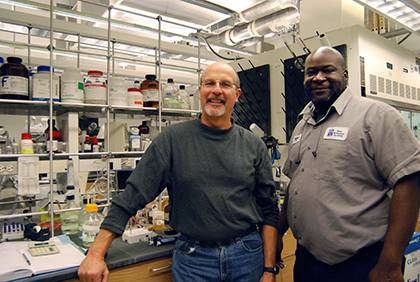When One Man’s ‘Trash’ Really is Treasure
Duke faculty loses research, but Facilities employee helps recover it

It was an accident, surely, but in the realm of mistakes, it might have simply been a disaster series of unfortunate events.
It was July, and Bob Mook needed to defrost a freezer in his lab at the Levine Science Research Center. He emptied the contents into a small box on the floor - about 100 vials of chemicals and research materials safely stored away. But when Mook left for the night, samples that represented years of work on anti-cancer drugs were left sitting in the box while the freezer defrosted overnight.
When he returned the next morning, his samples were gone.
“I contacted our housekeeping staff to see if the samples could easily be found in the trash, but it turned out they had already been dumped into a compactor and they could not be retrieved without dumping the entire contents of a large 25-foot long compactor,” said Mook, assistant professor in the Division of Gastroenterology.
“There were years of specialty chemicals that were pretty important not to lose, so we contacted Facilities Management.”
When Mook spoke with David Bryant, superintendent for sanitation and recycling, Bryant said he would see what he could do to help.
“A day goes by and David calls me to say he arranged for the compactor to be taken to a Waste Industries transfer station in Durham,” Mook said. “I didn’t have to pull my hair out or beat on anyone’s door – he simply made it happen for me.”
And that’s how Mook came to meet Rodney Terrell, a senior sanitation equipment operator with Facilities Management and, perhaps, the most fortunate thing to happen to Mook amongst the whole unfortunate situation.

In 90-degree heat, with the sun beating down on him, Mook arrived at the waste station. After donning a cotton jump suit, gloves, boots, dust mask, goggles and a hardhat, he began sorting through a roughly 150-square foot pile of trash, but came up with nothing.
That is, until Terrell figured out the secret to the sleuthing.
“Based on how much trash was emptied and when all the work went missing, I made a determination of where the materials were in the pile,” said Terrell, who’s worked at Duke for six years. “I wasn’t going to stand by and watch Bob do it himself, so it was a no-brainer to get in and help him out.”
Terrell threw on some gloves and protective gear, started digging and within 10 minutes found a vial. Then another. And another.
“He ended up finding every major spot in the trash that contained my samples, and the whole time in the heat and trash and stink Rodney just kept saying ‘no problem’, when I told him he did not need to dig through the trash with me “ Mook said. “About 85 vials were recovered and instead of a major problem, it’s just a funny story. That was years of work.”
In the months since, Mook’s work only saw a slight setback, but was able to continue research on anti-cancer drug candidates because of Terrell’s help. For going above-and-beyond, Terrell was also recognized by his Facilities Management colleagues and named as one of five Employees of the Month in September.
“I was just happy we were able to recover all that information,” Terrell said. “Nobody should ever have to deal with a situation like that.”